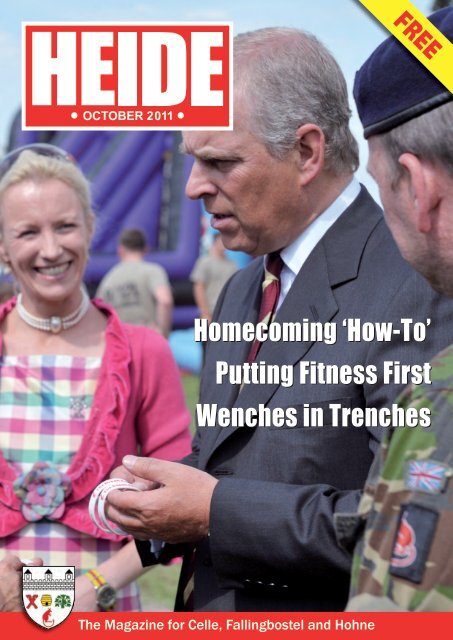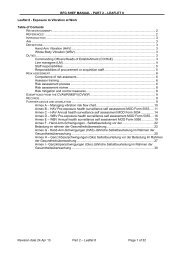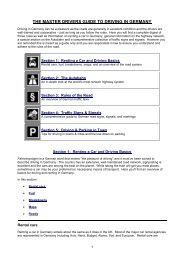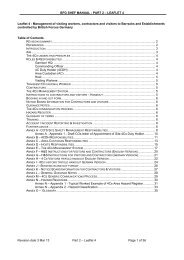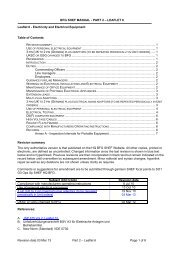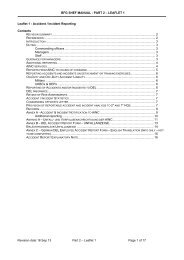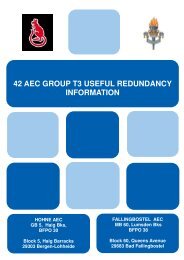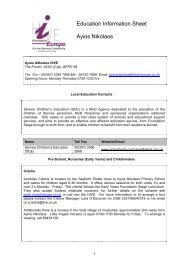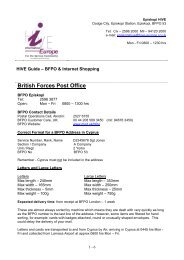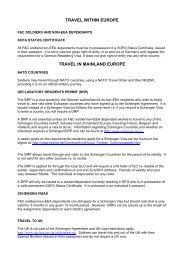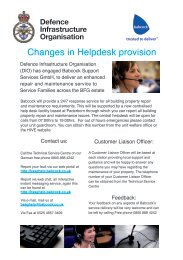october 2011 - British Forces Germany
october 2011 - British Forces Germany
october 2011 - British Forces Germany
Create successful ePaper yourself
Turn your PDF publications into a flip-book with our unique Google optimized e-Paper software.
•OCTOBER <strong>2011</strong>•<br />
Homecoming ‘How-To’<br />
Putting Fitness First<br />
Wenches in Trenches<br />
The Magazine for Celle, Fallingbostel and Hohne
SerengeTi parK fun p 14<br />
puTTing fiTneSS firST p 21<br />
4 SCOTS HigHland gameS p 26<br />
Editorial Jess Barbier-Marsden, Garrison Information Officer<br />
Covering Bad Fallingbostel<br />
Hohne and Celle<br />
inside HEIDE this month:<br />
Need to Know 8, 17, 27<br />
Garrison News 10 - 11, 26, 29 - 30, 39<br />
Op HOME RAT 12 - 14, 21<br />
HERRICK Headlines 16 - 17<br />
Community Health 18 - 20<br />
Schools News 22 - 23<br />
Library 28<br />
SSAFA News 31<br />
‘What’s On’ Leisure Guide 32 - 36<br />
Army Welfare Service 40<br />
Chaplain’s Chatter 41<br />
UNIT UPDATES 42 - 54<br />
Classified 55 - 65<br />
Garrison Telephone Numbers 66 - 67<br />
FRONT COVER:<br />
HRH Prince Andrew The Duke of York visits 9 th /12 th Royal<br />
Lancers and accepts 7 th Armoured Brigade wristbands, as<br />
Mrs Juliet Fooks, CO 9 th /12 th Lancers’s wife, looks on.<br />
FRONT COVER PHOTOGRAPH:<br />
Cpl J Williams, RLC. Crown Copyright <strong>2011</strong>.<br />
Copyright: Heide magazine is published by kind permission of the<br />
Commander, Bergen-Hohne Garrison. It is not an official publication<br />
and the views expressed, unless specifically stated otherwise, do<br />
not reflect MoD, Army or Garrison policy or are the personal views of<br />
the author. No responsibility for the quality of the goods or services<br />
advertised in the magazine can be accepted by the publishers or<br />
printers. On occasion, articles may have to be altered or edited.<br />
Printed by Mundschenk Druckverlag. www.mundschenk.de<br />
Deadline for November edition: Weds. 12 October<br />
HEIDE Magazine Tel: 05051 914271 BFBS Studios, Hohne Station, 29303 Lohheide (BFPO 30)<br />
4 | HEIDE | OCTOBER <strong>2011</strong><br />
Homecoming is here! Welcome home to all of our 7th Armoured Brigade ‘Desert Rats’ that have already<br />
arrived, and to those that will be arriving later this month. In this issue we have ‘Homecoming How-To’,<br />
a helpful guide through the range of emotions that can occur around homecoming time, with a special section<br />
on how children handle homecoming at different ages. Did you know that there is a special homecoming<br />
DVD that you can rent too? It is available to borrow from your Unit Welfare Offices, libraries, and HIVEs.<br />
Our final Garrison Op HOME RAT park trip was to Wildpark Lüneburger Heide in September, so check<br />
out the photos in the next issue of Heide Magazine. Next month we will also feature photos of some of<br />
the homecoming parades. Finally, best of luck to those elements of 16 Tank Transporter Regiment, based in<br />
Fallingbostel Station, that are deploying on Op HERRICK 15!<br />
Have a great month!<br />
gareth favis, Assistant Editor<br />
e-mail: garrisonmagazine@yahoo.com<br />
ren ruddy, Advertising Manager<br />
e-mail: garrisonadvertising@yahoo.com
Foreword Brigadier Paul Nanson MBE, Commander 7 th Armoured Brigade<br />
It’s a real pleasure to be<br />
finally writing a foreword that<br />
contains an article entitled<br />
‘Homecoming How-To!’ By the<br />
time you read this we will have<br />
already welcomed back the<br />
first flights from Afghanistan<br />
and there will be a definite<br />
‘light at the end of the tunnel’<br />
feel about the place. I visited<br />
Theatre in August and managed<br />
to see most of our units – they<br />
were all in excellent form; tired<br />
but buoyant after a hugely<br />
successful summer. They were<br />
all obviously looking forward to<br />
coming home.<br />
I did promise to ensure you were the first to know of any significant updates<br />
regarding the implications of last year’s Strategic Defence and Security<br />
Review (SDSR). As you know, SDSR marked the start of transforming Defence<br />
to meet the challenges of the future aiming for a coherent and affordable<br />
Defence capability for 2020 and beyond. More recently a Review has been<br />
conducted to fully close the gap between the cost of Defence and the money<br />
available to deliver it. This has resulted in a number of announcements<br />
which will mean changes for you and your family. I realise this has caused<br />
much uncertainty and I thought I would use this opportunity to share what I<br />
know about the three issues which are causing you most concern.<br />
rebasing: On 18 July <strong>2011</strong> the Secretary of State gave a statement to the<br />
House of Commons on Defence Transformation, stating that the two Multi-<br />
Role Brigades currently based in <strong>Germany</strong> would move back to Scotland,<br />
centred on Kirknewton, south-west of Edinburgh, and the East Midlands in<br />
England, centred on Cottesmore. So what does that mean for us? I stress<br />
that it has not been finally decided which Brigade will go where, but the<br />
planning assumption is that 7 th Armoured Brigade will move to Scotland. The<br />
reason for this is that 7 Brigade finishes in Afghanistan before 20 Brigade<br />
(HERRICK 19 v HERRICK 20), and so will be available to move first. Since<br />
the political direction is that Scotland be occupied first, it is a relatively<br />
safe assumption – but not a certainty – that we will be based north of<br />
the border. In Scotland, units will be moved into Glencorse, Caledonia,<br />
Albemarle Barracks (in Northumberland) and eventually Arbroath, as it is<br />
intended to bring the bulk of the Royal Marines together in the south-west<br />
of England. Two major units and a formation HQ will be based at Leuchars –<br />
the former RAF Station. ‘When’ we are likely to move remains unclear, but I<br />
can report that it will not be before we complete HERRICK 19, so not before<br />
the Summer of 2014 – but again I stress this is a planning yardstick.<br />
In other moves you should be aware that Trenchard Barracks, and therefore<br />
Celle Station, will close in 2013. 2 RRF will be the last battalion in that<br />
barracks although some quarters will be retained and absorbed into Hohne<br />
Station. Additionally, we have just been informed that 1 Med Regt will now<br />
move to Hohne next summer.<br />
allowances: The cuts to allowances have<br />
hit us all hard. I think we all understand why<br />
the cuts are needed and please rest assured<br />
that I represent your concerns up the chain<br />
of command. I do remain committed to<br />
ensuring that, whilst we continue to serve in<br />
<strong>Germany</strong>, the ‘offer’ reflects the challenge<br />
that living away from the UK brings with it, for<br />
us and our families. It is difficult – there is<br />
no more money, and our senior officers have<br />
to balance ever decreasing resources with<br />
a multitude of demands. I can report that,<br />
whilst there are no new cuts, some of the<br />
changes are now coming into effect. Soldiers<br />
returning from operations will notice a drop<br />
in monthly income as operational allowances<br />
cease. I would ask you all to plan ahead and,<br />
if necessary, ask Welfare Staff or Regimental<br />
Accountants about where to find financial<br />
advice. There is no more news on pensions<br />
or Continuity of Education Allowance (CEA); I<br />
will keep you posted.<br />
redundancy: A number of soldiers will have<br />
been made redundant in the recent first<br />
tranche announcements. They will now be<br />
assisted to transition into civilian life and, rest<br />
assured, they will get the full support of the<br />
Brigade. There are, as I am sure you are well<br />
aware, more redundancies to come and the<br />
recent announcement of a further cut to the<br />
Army’s regular cohort means that the details<br />
of the next tranche will now not be available<br />
until January 2012. Again, as soon as the<br />
information is known, I will pass it on.<br />
On the home front we are now making<br />
excellent progress on the new briefing centre<br />
and cinema for Fallingbostel, which should<br />
open for Christmas, as well as the swimming<br />
pool cover in Hohne which will be ready early<br />
next year. And as the troops return, we are<br />
delighted to have our new online travel guide<br />
for the Garrison up and running on WikiTravel<br />
– more on all this in the magazine. Finally,<br />
in this October issue, I have asked that we<br />
continue my push on information concerning<br />
the medical system and, on a lighter note,<br />
I trust articles on the Duke of York’s visit to<br />
9 th /12 th Lancers and the Op HOME RAT trip<br />
to Serengeti Park will provide you with some<br />
colour to brighten up the autumn weather<br />
and bring back some memories of summer<br />
in the Garrison.<br />
OCTOBER <strong>2011</strong> | HEIDE | 5
GarrIson<br />
nEWs rounDuP<br />
10 | HEIDE | OCTOBER <strong>2011</strong><br />
Coffee with the Commander<br />
Brigadier Paul Nanson MBE, Commander of 7 th Armoured Brigade, visited 4 SCOTS (The Highlanders) to meet<br />
some of the families of deployed and Rear Ops Group (ROG) soldiers at a coffee afternoon in late summer, demonstrating his commitment<br />
to families and soldiers across the Brigade. “It was nice to meet him,” said Tracey Ferguson, whose five-month old son was six weeks old<br />
when his father deployed. “I’d never met the Commander before.” Emma Duncan agrees, saying, “We talked about family and how long<br />
I’ve been here, and what we’re going to do [as a family] when we go back to the UK.” Brigadier Nanson made a point of meeting every spouse<br />
who attended the event,<br />
chatting to them about<br />
how the tour was going,<br />
his own experiences of<br />
living in Fallingbostel,<br />
and dispelling rumours<br />
about rebasing before<br />
continuing his tour of<br />
the Regiment, leaving<br />
the families to enjoy<br />
the sunshine and cakes<br />
at Hectors.<br />
2 medical regiment CO departs in Style<br />
Lt Col Simon Orr, Commanding Officer, 2 Medical Regiment, had the<br />
honour and tremendous challenge of forming the Regiment – the newest<br />
in the <strong>British</strong> Army – from its inception out of A (29) Sqn, 1 CS Medical<br />
Regiment in 2008 and leading it into combat on Op HERRICK 10 just<br />
eight months later. Such a quick turnaround from inception to operational<br />
deployment is almost unheard of, and the amount of effort that the Regiment, led<br />
by its Commanding Officer, had to expend cannot be underestimated. Op HERRICK<br />
10 was the toughest summer of fighting to date but 2 MED REGT gave an excellent<br />
account of itself in a fighting season unequalled in violence: many lives were saved<br />
and injuries minimised in severity by the quick actions and excellent treatment<br />
that its medics provided both on the ground and in hospitals and medical centres<br />
across Afghanistan. The actions of the medics and the officers, as well as bringing<br />
everyone back alive, made Lt Col Orr truly proud to have been the Commanding<br />
Officer of 2 MED REGT.<br />
After three successful years in<br />
command, Lt Col Orr bid farewell to<br />
2 MED REGT at the end of July. Lt<br />
Col Orr leaves behind him a Regiment<br />
that is operationally proven<br />
with a fantastic family feel and an<br />
ethos unrivalled by other medical<br />
regiments. His achievements with<br />
the Regiment, from formation to<br />
operational deployment, cannot<br />
be downplayed. Lt Col Orr was sad<br />
to be be leaving and named his<br />
time commanding 2 MED REGT as<br />
“the happiest time of my life.” The<br />
Regiment lined the street as Lt Col<br />
Orr left for the final time, departing<br />
Hohne Station in style in a vintage<br />
Cadillac convertible.<br />
2 Medical Regiment and<br />
the Garrison would like to<br />
take this opportunity to wish<br />
Lt Col Orr all the very best in<br />
the future.
HrH prince andrew The duke of York<br />
Visits 9 th /12 th lancers<br />
GarrIson<br />
nEWs rounDuP<br />
The Royal Colonel-in-Chief of the 9 th /12 th Royal Lancers, His Royal Highness (HRH) Prince<br />
Andrew The Duke of York, visited his Regiment in support of their participation on the<br />
Op HERRICK 14 deployment on 27 July. The Duke’s visit coincided with a Families Day, and<br />
he focussed on meeting the families of deployed personnel, welfare staff and members of<br />
the Rear Operations Group (ROG). Prince Andrew also met the Mayor of Bergen, Herr Rainer<br />
Prokop, and signed the Golden Book of Bergen in commemoration of his visit. During a<br />
private meeting, The Duke of York also presented the family of LCpl Paul Watkins, killed in<br />
Afghanistan in July, with the Elizabeth Cross – a commemorative emblem given to the next<br />
of kin of members of the <strong>British</strong> Armed <strong>Forces</strong> killed in action.<br />
Major Lee Barnett, OC ROG, who welcomed the Duke of York to <strong>Germany</strong>, said: “We are<br />
delighted that HRH the Duke of York was able to take the time out of his busy schedule to<br />
visit the families of soldiers currently deployed in Afghanistan. We hope that he got a feel for<br />
how the families are coping with the deployment of their loved ones and can see first hand<br />
the myriad of support<br />
and events that have<br />
and is still being provided<br />
to ensure families are<br />
looked after here on the<br />
home front, enabling<br />
the deployed soldiers to<br />
concentrate on their job<br />
in Afghanistan.”<br />
HRH The Duke of York said: “It is an honour and a privilege to visit my<br />
Regiment here in <strong>Germany</strong> and a huge pleasure to meet the families of<br />
deployed soldiers and members of the Lancers’ Rear Operations Group.<br />
It was a good opportunity to see first hand the vital work the regiment is<br />
doing to ensure the welfare of all those families whose loved ones are<br />
currently serving in Afghanistan.”<br />
royalty Shows Support for desert rats<br />
HRH Prince Andrew The Duke of York accepted a pair of 7 th Armoured Brigade wristbands for his daughters,<br />
Princesses Beatrice and Eugenie, from Op HOME RAT Coordinator Fiona Anderson during his recent visit to his Regiment 9 th /12 th<br />
Royal Lancers. The Op HOME RAT ‘Famous Hands’ campaign aims to capture celebrities on camera showing their support to<br />
7 th Armoured Brigade, so watch for the princesses and other celebrities to be wearing ‘Desert Rats’ wristbands soon!<br />
don’t have a<br />
wristband yet?<br />
pick one up now<br />
from your unit<br />
Welfare Office<br />
(uWO) or station<br />
HiVe.<br />
OCTOBER <strong>2011</strong> | HEIDE | 11
Op HOme raT: Your guide to Homecoming<br />
excitement is mounting across the garrison as we welcome our 7 th armoured<br />
Brigade troops home from deployment on Op HerriCK 14 in afghanistan!<br />
The bunting is going up, and flags are at the ready, but don’t forget to prepare emotionally too – homecoming<br />
brings with it a host of complex feelings. Re-adjustment to ‘normality’ after you or your soldier has been away<br />
from home for a long time can be difficult. Partners may feel undermined at giving up control of things they have<br />
managed perfectly well on their own during the tour, or that the returning soldier is causing upset to family routines, while soldiers may bring<br />
home difficult memories from theatre, or feel that the family has ‘had it easy’ and won’t understand what they have experienced. Knowing<br />
what to expect, and having a plan for how you will both deal with issues that may arise during the readjustment period, will help to minimise<br />
the strain and ease the transition to non-deployment life.<br />
Homecoming Build-up:<br />
decompression and pOTl<br />
Prior to returning home after a deployment,<br />
soldiers will go through ‘decompression’<br />
– a formal break after leaving operational<br />
theatre – before returning home. This is<br />
followed by a short period of returning to<br />
work within barracks prior to taking postoperational<br />
tour leave (POTL). The process<br />
is designed to reduce the impact of postoperational<br />
stress by placing soldiers into a<br />
structured, monitored environment in which<br />
they can ‘wind down’ and return to normal<br />
peacetime routines gradually. It can take<br />
a few weeks for things to return to normal,<br />
and communication is key: to help handle<br />
the changes, talk through any negative<br />
feelings and give yourselves time to get<br />
reacquainted throughout this period.<br />
anticipation and adjustment<br />
Both deployed soldiers and family members<br />
may experience a feeling of anticipation as<br />
the tour draws to an end – either positive<br />
(eagerness to get home), negative (dread of<br />
a return that could potentially be filled with<br />
problems), or a mixture of both. Few get<br />
much sleep the night before homecoming,<br />
and children may be more moody or active<br />
than usual. Don’t be surprised if the whole<br />
family is keyed-up and exhausted when<br />
you finally reunite! When a soldier is home<br />
after the completion of an operational<br />
tour, it is not unusual to for you both to<br />
experience ‘homecoming let-down’ or<br />
‘post-tour blues’. In your minds, you have<br />
both created a fantasy of how things will<br />
be, and reality seldom fulfils it. To help<br />
avoid disappointment, don’t set your<br />
expectations too high, and keep a sense<br />
of proportion to your plans. Be receptive to<br />
each other’s needs, and understand that<br />
12 | HEIDE | OCTOBER <strong>2011</strong><br />
they will probably differ. Soldiers may want<br />
to stay at home and ‘do nothing’ initially,<br />
while spouses may be eager to go out and<br />
make the most of time together again. You<br />
may want your partner to help around the<br />
house, and they may not see the urgency of<br />
completing the tasks. The returning soldier<br />
may feel surprised or put out that you have<br />
managed without having them around, or<br />
jealous that you and your children may have<br />
become closer and done things that they<br />
missed out on. Children may wish to spend<br />
all of their time with the returning parent<br />
and may make you feel as though you no<br />
longer matter. Expectations are high all<br />
around, and if promises were made during<br />
the tour – on the phone, by e-mail or by<br />
letter – the person to whom the promises<br />
were made, especially if they are a child, will<br />
expect them to be kept. All of these feelings,<br />
actions, and expectations are normal and<br />
should not be taken personally. The key<br />
here is compromise: use a bit of ‘give and<br />
take’ to avoid arguments and hurt feelings.<br />
Don’t force issues and try to remain patient<br />
and tolerant with one another as you settle<br />
back into life together.<br />
unresolved problems<br />
and problem Solving<br />
If there were unresolved relationship or<br />
family issues before deployment, or these<br />
arose during R&R, they are still likely to<br />
be there when the soldier returns. Try to<br />
let a period of adjustment take its course<br />
first before tackling these issues. If you are<br />
worried about an issue, it will no doubt be on<br />
your spouse’s mind too, so choose a good<br />
time to talk after some time has passed.<br />
Avoid forcing the issue as soon as you walk<br />
in the door, as this may cause defensiveness<br />
and confrontation, and could make<br />
matters worse. Worrying, trying to cover up<br />
problems, or being defensive is not going to<br />
help solve issues – the key is to sort things<br />
out, in an open and calm way. Discussing<br />
ways to resolve matters is far more<br />
useful than shouting and finger-pointing.<br />
Here are some top problem-solving tips:<br />
• Choose the right moment and<br />
bring up the issue calmly.<br />
• Be honest.<br />
• Avoid blaming each other.<br />
• Realise that things sometimes<br />
happen simply because of the<br />
stress of separation.<br />
• Work out a solution together<br />
that you both agree on.<br />
• Try not to involve the children, and<br />
discuss matters out of their earshot.<br />
• Seek help from a professional<br />
agency if needed.<br />
• Talk over steps that you can take<br />
to avoid a repeat of the problem.<br />
• Discourage family visits for the<br />
first two weeks – it can be stressful<br />
having visitors around during the<br />
initial readjustment period.<br />
Children and reunion<br />
Change is at least as stressful for children<br />
as it is for adults, and a soldier’s return is a<br />
major change for children in the household.<br />
Although they have grown in every way<br />
– physically, emotionally and socially –<br />
during the tour, children have very little life<br />
experience and are not equipped to deal<br />
with stress, so their behaviour may alter<br />
when a parent comes home. As a reaction<br />
to changes within the household, children<br />
may regress to earlier, immature behaviour.<br />
They may become unruly and misbehave<br />
more often, or they might even withdraw<br />
inside themselves. The adjustment period<br />
may take around four to six weeks for the<br />
entire family, but you can greatly enhance<br />
your family’s reunion by developing realistic<br />
expectations of how your child will respond,<br />
based upon their age.
infants (Birth up to 12 months) An<br />
infant has not yet developed much of an<br />
ability to remember people or events, so<br />
do not be surprised when your baby does<br />
not recognise its parent. Small babies<br />
will cry when picked up by this ‘stranger’,<br />
which may be upsetting at first. However,<br />
the child will respond to what is going on<br />
around them: if the other parent is happy<br />
for this ‘strange person’ to be around,<br />
then the baby should also become<br />
more accepting. Speeding up the baby’s<br />
acceptance of this new person can be<br />
encouraged by taking part in activities<br />
together, such as bathing, feeding and<br />
changing the baby. Be patient and let your<br />
baby set the pace of the reunion.<br />
Toddler age (ages 1 to 3) A typical<br />
re-sponse from a toddler may be to run<br />
and hide from the newly returned parent,<br />
or to cling to mum and cry. Sometimes,<br />
toddlers can regress to younger stages<br />
of behaviour or bedwetting. This may be<br />
more prevalent if the returning parent<br />
has issues they may have brought back<br />
from their tour. This ‘new’ person may<br />
look intimidating to a small child, so talk<br />
to them at their eye level, and offer to play<br />
or do an activity. Don’t force the pace, as<br />
this could make the child uncomfortable.<br />
‘Out of sight, out of mind’ is normal for<br />
this age-group, so it may help to show the<br />
child pictures of the returning parent and<br />
mention them more often in conversation<br />
starting a few weeks before they return.<br />
pre-School age (ages 3 to 5) Children<br />
of this age tend to think that the world<br />
revolves around them. With that in mind,<br />
your child may think that they somehow<br />
made their parent go away because of<br />
something they did, or that their parent<br />
does not love them. If your child feels this<br />
way, they may feel guilty or abandoned,<br />
and they may express intense anger as a<br />
way of keeping the returning parent at a<br />
distance, thereby protecting themselves<br />
from further disappointment. Your child<br />
is likely to try some form of limit-testing<br />
to see if the rules applied during the<br />
parent’s absence still apply now that they<br />
are back.<br />
School age (ages 5 to 12) Children of<br />
this age group are likely to give parents<br />
a very warm welcome, as long as the<br />
relationship was strong before the parent<br />
left. They will probably be genuinely<br />
excited about the homecoming, and will<br />
most likely run to their returning parent as<br />
soon as they see them, try and manipulate<br />
all their attention, and talk their socks off!<br />
If the relationship was not so strong, or<br />
was strained in some way, the child may<br />
dread or even fear the return of a parent.<br />
They may worry about being punished for<br />
any misbehaviour that was highlighted<br />
during the period of absence. The<br />
best advice for this is to take a friendly<br />
interest in what your child is doing or<br />
has done, and focus on giving praise<br />
for their efforts and accomplishments.<br />
returning Single Soldiers<br />
Returning single soldiers encounter unique challenges when preparing for<br />
homecoming and it can be a very lonely time, regardless of whether you live<br />
in a barracks environment or in the community. Once you have reunited with<br />
friends and family, you may experience many of the common reactions on<br />
homecoming described previously. It is important to remember that there may<br />
have been changes in your social network and extended family, and it may<br />
take time to adjust and reintegrate. During your deployment you may have<br />
stretched your comfort zone, learning to adapt to foreign living and working<br />
environments, and it is important to consider the potential impact these<br />
personal changes may have on your social relationships. Family and friends<br />
may note changes in your appearance, self-confidence, and responsibility.<br />
It can be amazing how quickly and how significantly friendships can change<br />
during an absence. Some friendships will be re-established as if you were<br />
never away, while others will take time to develop, or may fade. Recognising<br />
that relationships have changed and that it is common to feel sad or mixed<br />
emotions is normal, and allow yourself time to adjust to the changes.<br />
If you are in a relationship, you and your girlfriend/boyfriend are likely<br />
to experience many of the reactions, concerns, etc. detailed earlier when<br />
discussing the experiences of married couples. Unlike a married couple,<br />
however, you may have had concerns about your partner’s commitment<br />
or faithfulness while you were away, or the direction your relationship may<br />
take now that you have returned. Take the time to discuss any concerns<br />
openly and honestly. Your parents/guardians may have experienced many<br />
of the same reactions and emotions that a partner may have felt while you<br />
were deployed. It is a good idea to share your and their experiences openly<br />
and honestly with them, just as you would with a partner. Try to understand<br />
that they are still concerned and worried about your safety and welfare<br />
despite your age and independence. Developing and maintaining a routine,<br />
exercising regularly, maintaining a good diet, participating in enjoyable<br />
activities, and developing new hobbies/interests can assist you in adjusting<br />
quickly to post-tour life.<br />
adolescents (ages 13 to 18) If you<br />
have a teenager in your family, then you<br />
will probably already have noticed ‘mood<br />
swings’, which manifest themselves in a<br />
roller-coaster of emotions. Teenagers may<br />
be excited about their parent’s return, but<br />
they could be concerned that they may<br />
be unfavourably judged or criticised. They<br />
might try to hide their real emotions to try<br />
and look ‘cool’. Be aware of this, and try to<br />
take time to talk to your teen, discussing<br />
what is happening in their lives, and how<br />
they feel.<br />
Help is at Hand<br />
Changes, even subtle ones, have taken place during<br />
the deployment for Service personnel, their family,<br />
friends and colleagues, and experience has shown<br />
that virtually everyone experiences some uneasiness<br />
as they readjust to the post-tour environment. To<br />
cope successfully with change requires that we make<br />
corresponding adjustments in attitude, thought, and<br />
behaviour, whether you are the returning soldier or<br />
the spouse who has ‘kept the home fires burning’.<br />
As you or your partner transition back to the predeployment<br />
environment, if you begin to feel angry<br />
or frustrated, slow down and ask yourself: ‘How<br />
realistic are my expectations in this situation?’ ‘Am<br />
I giving myself or others enough time and space to<br />
adjust?’ ‘Am I trying to force readjustment to happen<br />
rather than being patient and allowing it to happen<br />
at a comfortable pace?’ Remember that readjusting<br />
is a process, not an event. To allow the returning<br />
military member to reintegrate into their family, work<br />
and social environments, remember that this phase<br />
may well take time, patience and considerable effort.<br />
Be sensitive to stress reactions in yourself and your<br />
partner, and be prepared to seek assistance if<br />
necessary. Don’t be afraid to ask for support: there<br />
are a range of agencies available to help you, from<br />
the Army Welfare Service (AWS) to Relate counselling.<br />
For more information, refer to your Op HOME RAT<br />
booklet or ask in your Unit Welfare Office. Welcome<br />
home, and good luck!<br />
OCTOBER <strong>2011</strong> | HEIDE | 13
soLDIErs'<br />
nEWs rounDuP<br />
4 SCOTS: leading the Way in lashkar gah<br />
The Highlanders, 4 th Battalion The Royal Regiment of Scotland Battlegroup (4 SCOTS BG)<br />
transferred lead security authority of Lashkar Gar District Centre to the Afghan National<br />
Security <strong>Forces</strong> (ANSF) in August. A military parade – made up of troops from the ANA, the<br />
ANP, the National Directorate of Security (NDS), the Afghan National Civil Order Police (ANCOP),<br />
and a small contingent of ISAF troops<br />
including those from 4 SCOTS, the<br />
United States Marine Corps (USMC)<br />
and the Danish Army – took place<br />
outside the Governor’s Compound<br />
and was inspected by General Abdul<br />
Rahim Wardak, the Afghan Minister<br />
for Defence. In his speech to the ISAF<br />
Contingent, General Wardak thanked<br />
ISAF for their continued work in<br />
securing the province and improving<br />
the lives of the Afghan people. He also recognised the hardships of having to leave family<br />
and friends and travel thousands of miles to help Afghanistan rebuild itself. After 4 SCOTS<br />
troops marched off parade, they mounted their vehicles and drove away, with each of their<br />
vehicles being given a gift of flowers from local elders, a Pashtun custom that marks a<br />
respected guest. Lt Col Alastair Aitken MBE, Commanding Officer 4 SCOTS, says: “We have<br />
known for a long time that our<br />
Afghan Police partners have the<br />
competence and confidence to<br />
run security on their own. We have<br />
already moved into a supporting<br />
role in the city and its immediate<br />
vicinity. [This] is a milestone to<br />
demonstrate the progress that<br />
has been achieved through the<br />
sacrifice and dedication of both<br />
ISAF and Afghan forces here.”<br />
16 | HEIDE | OCTOBER <strong>2011</strong><br />
3 merCian: Welcome home B Coy!<br />
In September, around 150 soldiers from B<br />
Company (Coy) 3rd Battalion The Mercian<br />
Regiment (Staffords) (3 MERCIAN) returned<br />
home to Fallingbostel after completing a<br />
successful six-month tour on Op HERRICK<br />
14 in Afghanistan. The B Coy soldiers had<br />
been working with the Afghan National Army<br />
(ANA) and the Afghan National Police (ANP)<br />
in Helmand Province since February, carrying<br />
out security checks along Highway 601 –<br />
a notoriously dangerous road – and their<br />
successes include capturing the highestranking<br />
Taliban member ever taken by <strong>British</strong><br />
forces, who was caught during a fierce firefight. Lt Col Giles Woodhouse, Commanding Officer<br />
3 MERCIAN, met the soldiers at Camp Bastion before they returned to <strong>Germany</strong> and thanked<br />
them for their efforts. “B Company has made a fantastic contribution,” Lt Col Woodhouse<br />
noted. “It has not been an easy tour but they have<br />
had some notable successes. This marks the<br />
beginning of the end of 3 MERCIAN's deployment<br />
with A and C companies coming back in six weeks."<br />
Well done and welcome home!<br />
A Warrior armoured fighting vehicle on patrol with<br />
B Company, 3 MERCIAN, in Helmand province, Afghanistan<br />
[Picture: Crown Copyright/MOD <strong>2011</strong>]<br />
HErrICk HEaDLInEs:<br />
SCOTS dg:<br />
In six weeks over the summer<br />
alone, the SCOTS DG C Sqn<br />
WARTHOG Group covered a total<br />
distance of 41,000km (or 25,625<br />
miles) – equal to circumnavigating<br />
the globe, or travelling the<br />
distance overland from Camp<br />
BASTION to Edinburgh five and a<br />
half times! Each of their vehicles has<br />
covered an average of 850 miles, or the<br />
distance by road from Land’s End, in<br />
the south of Englad, to John O’Groats in<br />
the north of Scotland. During their tour,<br />
the Sqn has operated in almost every<br />
part of the Task Force Helmand Area of<br />
Operations, from deep within the dense<br />
Green Zone to the sand dunes of the<br />
Afghan deserts. The WARTHOGs and<br />
men of D Squadron have worked in every<br />
imaginable environment, interacting<br />
with the locals (some welcoming, some<br />
less so) on an almost daily basis, all<br />
under the relentless heat of the Afghan<br />
summer sun which in the desert has<br />
so far reached 56 degrees Celsius (or<br />
133 degrees Fahrenheit). Needless<br />
to say, the lads are looking forward to<br />
coming home to Fallingbostel and the<br />
approach of winter – snow and subzero<br />
temperatures would be a welcome<br />
change!
nEWs From THEaTrE<br />
9 th /12 th lancers: On patrol with the afghan army during ramadan<br />
Ramadan is the Islamic holy month of fasting, intended to teach Muslims about patience<br />
and spirituality. During Ramadan, Muslims are encouraged to pray more often than normal, and<br />
those participating fast during daylight hours, which meant that ANA soldiers would go out on patrol<br />
in temperatures around 50 degrees Celsius without eating or drinking anything the entire day.<br />
The warriors of the 1 st Tolay (Company) based at Patrol Base 4 in Nahr-e Saraj, Helmand Province,<br />
undertook their patrols helped and advised along the way by elements of 9 th /12 th Royal Lancers,<br />
part of Task Force Helmand. Captain George<br />
Duffield was the Officer Commanding the<br />
1 st Tolay Advisory Team. “The ANA made<br />
the decision that they would continue to<br />
patrol and train throughout Ramadan<br />
despite the added hardship of their fasting<br />
during daylight hours,” Capt Duffield<br />
said. “They have remained focused and<br />
continue to work hard, which has been<br />
very impressive.” After they completed<br />
their morning patrols, the warriors of the<br />
9 th /12 th Royal Lancers, with some of the Afghan National<br />
Army soldiers he is responsible for training and mentoring<br />
[Picture: Crown Copyright/MOD <strong>2011</strong>]<br />
advice for those taking the life in the uK Test<br />
PS4(A) is aware of a small number of F&C Citizens travelling from <strong>Germany</strong> and<br />
Cyprus to take the UKBA Life in the UK Test who, on arrival at test centres, have<br />
been unable to provide the necessary supporting documents to take the test. The<br />
examples quoted include producing evidence of a UK address supported by a recent utility bill. This issue has been taken up by the MoD with<br />
the UKBA. Whilst a solution is sought anyone planning to travel from overseas to the UK to take the Life in the UK Test is advised to pre-check<br />
the eligibility requirements with the UK Test Centre they plan on using prior to arranging travel in order to ensure they are able to provide the<br />
appropriate documentation. The current UKBA advice says: ‘You must also bring official proof of your postcode in order to take your test –<br />
this could be a bank or utility bill’. Visit http://lifeintheuktest.ukba.homeoffice.gov.uk/htmlsite/booking_10.html for more information.<br />
german air Trooping Service (gaTS) flight Timings<br />
Day<br />
WINTER SCHEDULE (30 October <strong>2011</strong> - 24 March 2012)<br />
Departure<br />
Airport<br />
Arrival<br />
Airport<br />
Departure<br />
Time<br />
Arrival<br />
Time<br />
Flight<br />
Number<br />
Wed Hannover Birmingham 1100 1135 RR5015/AB3715<br />
Wed Birmingham Hannover 1220 1440 RR5014/AB3714<br />
Sat Hannover Birmingham 1415 1450 RR5015/AB3715<br />
Sat Birmingham Hannover 1535 1755 RR5014/AB3714<br />
Sun Paderborn Birmingham 1430 1455 RR5007/AB2699<br />
Sun Birmingham Paderborn 1540 1800 RR5006/AB2698<br />
Bielefeld Travel Centre:<br />
BTC WO 81 3742<br />
Flight Sergeant (FS) - 81 3381<br />
Booking Clerks - 81 3743/3146<br />
Airport Contacts:<br />
ATLO Hannover (HAJ) - (+49) 01722 071539<br />
ATLO Paderborn (PAD) - (+49) 01722 994177<br />
CAD Birmingham (BHX) - (+44) 7766 365616<br />
Words and Images: Courtesy of Unit Press Officers and 7 th Armd Bde Media Team.<br />
WO2 Nick Galley, 9 th /12 th Royal Lancers,<br />
conducting weapons training with Afghan<br />
National Army soldiers from the 1st Tolay<br />
[Picture: Crown Copyright/MOD <strong>2011</strong>]<br />
1 st Tolay threw themselves into a training programme aimed at increasing their<br />
all-round military skills. Taking place during the cool of the morning, the training<br />
programme qualified the Afghan troops in five key military disciplines – counter-<br />
IED training, navigation, battlefield first aid, weapon handling and patrolling skills<br />
– and was aimed at long-term role sustainability.<br />
The BFBS <strong>Germany</strong> channel (BFBS Radio 1)<br />
has moved and can now be found on the<br />
following frequencies: Hohne - 106.7 MHz<br />
Fallingbostel - 100.1 MHz<br />
There will be an employment/interview<br />
Clinic for all dependants who wish to<br />
learn more about how to apply to jobs<br />
with the GLSU – covering dos and don’ts,<br />
interview tips and techniques, and a Q&A<br />
session. The event is free and will be held<br />
on Wednesday 12 Oct 11 at 1400 hrs<br />
in the AEC in Hohne. All dependants are<br />
welcome! If the event is successful, it will<br />
be held next month in Fallingbostel.<br />
GLSU (Hohne) RLC<br />
OCTOBER <strong>2011</strong> | HEIDE | 17
CommunITY<br />
HEaLTH ask Dr. JEFF<br />
18 | | HEIDE | OCTOBER <strong>2011</strong><br />
Every month, Dr. Jeff Macleod<br />
from Hohne Medical Centre<br />
answers your health questions.<br />
Dear Dr Jeff, I have heard that October is Breast Cancer Awareness Month. What does this mean?<br />
Breast cancer is the most common cancer in the UK. In 2008, 48,034 cases were diagnosed – 99% of which were in women. Breast cancer<br />
can also appear in men, though this is rare. One in eight people are affected by breast cancer at some point in their life. October is Breast<br />
Cancer Awareness Month to bring attention to being ‘breast aware’ – knowing the look and feel of your breasts to help you detect changes<br />
early and seek help.<br />
Fiona Morrison, an Enhanced Primary Care Nurse at the Hohne Medical Centre, has written this article on how to be breast aware. Fiona<br />
is completing her Nurse Practitioner training, which will allow her to manage a range of medical problems that were traditionally managed<br />
only by doctors, including minor ailments, asthma, hypertension, women's health, and family planning, and she will soon be an independent<br />
prescriber, meaning that she can prescribe medication in a similar way to a doctor. If you are lucky enough to see Fiona as a patient you will<br />
quickly appreciate what a thorough clinician she is.<br />
HOW TO Be BreaST aWare<br />
By Fiona Morrison<br />
Breast awareness means knowing<br />
how your breasts look and feel, and<br />
knowing what changes to look out for.<br />
Breast awareness also means getting<br />
into the habit of examining your<br />
breasts from time to time by feeling<br />
and looking at your breasts so you<br />
know what is normal for you.<br />
There is no formal set of instructions in how<br />
to check your breasts, but examples of how<br />
to do so may be as follows:<br />
- Look for changes in your breasts before<br />
a bath or shower, using a mirror to view<br />
your breasts from different angles.<br />
- Feel for changes in your breasts in the<br />
bath or shower using soapy hands.<br />
- Check your breasts when lying down<br />
in bed.<br />
Once you are familiar with the usual feel<br />
and appearance of your breasts, you will<br />
notice if anything changes from what is<br />
normal for you.<br />
COMMON BREAST CHANGES<br />
Your breasts change throughout your life<br />
and will be affected your menstrual cycle,<br />
your age, pregnancy, the menopause and<br />
the contraceptive pill. It is important to<br />
remember that changes in how your breasts<br />
look and feel are not always a cause for<br />
concern – for example, it is normal for<br />
breasts to feel tender and lumpy before your<br />
period.<br />
During and after the menopause, your<br />
breasts may change in size. They may also<br />
feel softer and less lumpy. If you have a<br />
hysterectomy before the menopause, your<br />
breasts may still feel tender or lumpy each<br />
month even though you no longer have<br />
periods, as your ovaries are still working and<br />
producing hormones.<br />
editor’s note: THinK pinK!<br />
For more information, you may wish to visit http://www.breastcancercare.org.uk/,<br />
http://www.breastcanceruk.org.uk/, or http://www.macmillan.org.uk/<br />
During the month of October, many shops in the UK sell<br />
special pink products, with a portion of the proceeds<br />
from these items going to support breast cancer<br />
research. Keep an eye out for these pink items if you’ve<br />
started your online Christmas shopping, or take a look at<br />
http://shop.breastcancercare.org.uk/.<br />
WHEN TO SEEK ADVICE<br />
See a GP if you notice changes that are not<br />
normal for you, especially if the changes are<br />
in only one breast. Breast changes to look<br />
out for include:<br />
- A change in the size, shape or feel<br />
of your breast.<br />
- Dimpling, puckering or redness<br />
of the skin.<br />
- A rash or crusting on your nipple<br />
or surrounding area.<br />
- A change in your nipple, such as a<br />
change in its shape or if it becomes<br />
inverted and turns in towards the breast.<br />
- Discharge from your nipple<br />
(unless breastfeeding).<br />
- Bleeding from your nipple.<br />
- Pain in part of your breast or armpit.<br />
- Swelling, thickening or a lump<br />
in your breast or armpit.<br />
These symptoms do not mean that you<br />
have cancer, just that you should see a GP.<br />
5 POINT BREAST AWARENESS CODE<br />
1. Know what is normal for you.<br />
2. Check both the look and feel<br />
of your breasts.<br />
3. Know what changes to look<br />
and feel for.<br />
4. Report any changes to your GP.<br />
5. Attend routine screening if you<br />
are over 50.<br />
If you have health questions that you’d like Dr Jeff to answer in upcoming issues, email garrisonmagazine@yahoo.com
patient complaint procedure<br />
<strong>British</strong> <strong>Forces</strong> <strong>Germany</strong> Health Service is committed to providing<br />
a health service that is at least as good as the NHS in the UK<br />
COMMENTS/MINOR PROBLEMS<br />
If you wish to make comments or have<br />
problems of a minor nature, then you<br />
are advised to speak to the health care<br />
professional who is responsible for your<br />
health care as soon as possible. It is<br />
hoped that most problems will be able to<br />
be dealt with at this level and not reach<br />
the level of a complaint.<br />
COMPLAINTS - WHAT TO DO<br />
You may approach any member of the<br />
healthcare team with a complaint. They<br />
will direct you to the Medical Officer in<br />
Charge or the Complaints Manager within<br />
the garrison where you receive medical<br />
services. Upon receipt of the complaint,<br />
the Complaints Manager will write a<br />
letter of acknowledgment to you within<br />
2 WOrKing daYS.<br />
The Complaints Manager will ensure all<br />
aspects of the complaint are investigated.<br />
If your complaint to the medical centre<br />
includes aspects of hospital care the<br />
Complaints Manager will send a copy of<br />
your complaint to the Hospital Operations<br />
Manager for action.<br />
The Complaints Manager will write to you<br />
within 20 WOrKing daYS.<br />
Supporting Supporting victims victims of of crime<br />
nEW number,<br />
sAME Trusted service<br />
If If If you you you have have been been affected affected by by crime, crime,<br />
call call us us us on on on our our nEW nEW number: number:<br />
05251 1809 340<br />
Email:<br />
Email:<br />
ssafa.victimsupport1@ssafa.org.uk<br />
ssafa.victimsupport1@ssafa.org.uk<br />
f f<br />
www.victimsupport.bfgnet.de<br />
www.victimsupport.bfgnet.de<br />
find<br />
the<br />
strength<br />
Approved by<br />
Approved by<br />
Approved by<br />
SSAFA <strong>Forces</strong> Help Charity No. 210760 Est. 1885, Registered Charity (Scotland) No. SC038056 Victim Support Charity No 298028<br />
SSAFA <strong>Forces</strong> Help Charity No. 210760 Est. 1885, Registered Charity (Scotland) No. SC038056 Victim Support Charity No 298028<br />
SSAFA <strong>Forces</strong> Help Charity No. 210760 Est. 1885, Registered Charity (Scotland) No. SC038056 Victim Support Charity No 298028<br />
CommunITY<br />
HEaLTH<br />
The complaint response will include:<br />
• A summary of your complaint<br />
• Outcome of investigations/meetings<br />
• Clear written explanations for you<br />
• An apology, where appropriate<br />
• Notification of action taken to prevent reoccurrence if appropriate<br />
• Offer of a meeting between you and relevant staff if appropriate<br />
• How to obtain further support and information<br />
• How to take your complaint to the next stage of the complaints process<br />
if you are dissatisfied<br />
To be resolved most quickly, complaints are best dealt with using the Primary and<br />
Community Care Complaints Procedure. However if you remain unhappy with the way<br />
in which the complaint has been dealt with or outcome, the Complaints Manager will<br />
direct you how to take your complaint to the next stage of the complaints process.<br />
CONFIDENTIALITY Confidentiality will be maintained at all times. Only members of staff<br />
who need to be aware of your complaint will be involved. Your consent will be requested<br />
if we need to pass on your complaint to other organisations.<br />
COMPLAINING ON BEHALF OF SOMEONE ELSE Someone else can make a complaint<br />
on your behalf, as long as you give signed permission for this to take place.<br />
TIME LIMITS A complaint should be made as soon as possible after the action giving<br />
rise to it as this makes a satisfactory and early resolution of the complaint more likely. If<br />
it not possible then the complaint should be received within 6 MONTHS of the incident<br />
that caused the problem or discovering that a problem had occurred.<br />
FURTHER HELP? If you require further help or advice, please ask to speak to the<br />
Complaints Manager or Medical Officer in Charge of the medical centre where you are<br />
registered.<br />
Key medical numbers<br />
to Put into Your Mobile or Wallet Now<br />
Call 112 in a medical emergency!<br />
If you believe that life is in danger or an accident or illness is serious<br />
enough to require accident and emergency (A&E) treatment, then<br />
you must call the local ambulance service using the emergency<br />
telephone number 112. Once the ambulance service has been<br />
called, you should call your local Medical Centre to alert them to<br />
liaise with your Unit and Welfare Services where appropriate.<br />
Call 0800 588 99 36, the Hospital Hotline, if you are taken<br />
to a German hospital.<br />
If you are admitted to a German hospital in an emergency, you<br />
should call the Hospital Hotline. It is manned 24 hours a day, 365<br />
days a year by a Hospital Liaison Officer (HLO). HLOs are fluent in<br />
German and English and can assist you with language problems.<br />
They are also familiar with procedures and practices within German<br />
hospitals and can help make your stay as comfortable as possible.<br />
Acting on your behalf, and with your consent, the HLOs will also<br />
liaise between the hospital, the Medical Centre, the Unit and the<br />
welfare agencies (where applicable) to ensure administrative tasks<br />
are carried out promptly.<br />
Call your local medical Centre for non-life threatening<br />
accidents and illnesses. If you are not well, the starting point is<br />
your local Medical Centre. If you need urgent care advice and your<br />
local Medical Centre is closed, your call will be transferred 24 hours<br />
a day, 365 days a year, to qualified clinical staff who will assess<br />
your case and decide the best course of action. Put these three<br />
key medical numbers into your wallet or mobile phone now. You<br />
never know when you or your family might need them!<br />
OCTOBER <strong>2011</strong> | HEIDE | 19
it up.<br />
CommunITY<br />
HEaLTH mental Health: What it means for you<br />
The Army is promoting mental health awareness this autumn, and you may have read the article in Soldier<br />
Magazine about mental health, but what does ‘mental health’ actually mean? Broadly speaking, mental health covers<br />
everything from stress to ‘baby blues’, from anger management to depression and even substance abuse. “Getting stressed or depressed is<br />
a normal reaction to abnormal circumstances,” says Capt Tony Penny, Team Coordinator, Department of Community Mental Health (DCMH)<br />
Hohne. “Things like the kids playing up at school, loneliness during deployment, or just struggling to cope with what life throws at you can<br />
take their toll. We would like to remove the stigma that is attached to asking for help, and assist people in accessing our services.”<br />
Mental health is an important part of our physical and emotional well-being, but do you know how to access mental health services<br />
here in the Garrison? Here in Hohne Garrison, BFG Health Services has a professional team of consultant psychiatrist, a mental health<br />
social worker, a mental health occupational therapist, and even a children’s mental health service in place. To access the mental health<br />
service team, make an appointment to speak to a nurse or GP at your local medical centre at the following numbers:<br />
Don’t<br />
� STamping OuT THe STigma<br />
A new Army campaign focuses on the attitudes among Service<br />
personnel towards mental health issues. Targeted at all serving<br />
personnel, both Regular and Reserve, Don’t Bottle It Up aims<br />
to reduce the stigma associated with mental ill health, signpost<br />
the support and care services already available and encourage<br />
personnel to seek help if they need it, formally or informally.<br />
“Matters of the mind are not an easy topic of conversation,”<br />
admits Lt Col Tony Rock, the man charged with leading the Army’s<br />
first ever campaign to tackle the stigma of mental ill health. “People<br />
need to start thinking of mental health problems as an illness or<br />
injury, not a character defect.<br />
“There should be absolutely no shame in asking for help and<br />
those that do should be reassured that they will be treated the same<br />
as if they have a problem with their physical health.”<br />
Current research indicates that the Armed <strong>Forces</strong> have no more<br />
of a problem with mental health issues than society as a whole. But<br />
particular groups within the Armed <strong>Forces</strong> may be more vulnerable<br />
to certain disorders and the MoD continues to fund research<br />
20 | HEIDE | OCTOBER <strong>2011</strong><br />
it up.<br />
Find someone you<br />
can trust and talk<br />
it through.<br />
Army<br />
Health<br />
Promotion<br />
fit for life | fit to fight<br />
Celle – Mil 78 2320 / Civ 05141 963 2320<br />
Hohne – Mil 77 2218 / Civ 05051 962 2218<br />
Fallingbostel – Mil 76 2256 or<br />
2272 / Civ 05162 971 2256 or 2272<br />
Your GP or the nurse will provide a referral to the mental health<br />
team, who will then contact you to set up an appointment time.<br />
“We are lucky here in BFG because we have a lower threshold for<br />
referrals, which means that you can be referred for an assessment,<br />
even if all we need to do is find out the right person to point you<br />
to,” says Rosa Waddingham, BFG Health Service Group Practice and<br />
Locality Manager. The same process applies if children would like<br />
help, though they can also speak to their teacher, and the schools<br />
are able to refer children directly to the Children and Adolescent<br />
Mental Health Service (CAMHS).<br />
Stress, anger management, adjustment disorders, dealing with<br />
things that you have seen (including traumatic events), postnatal<br />
depression or ‘baby blues’, can all be handled by the mental health<br />
team, and you can also see them for issues such as problems<br />
with alcohol. “Sometimes we see people who are just feeling a bit<br />
overwhelmed, and letting it out in one session of talking therapy is<br />
enough for them to feel on track again,” says Capt Penny.<br />
The mental health team across the Garrison is working hard<br />
to break down the stigma that many people still attach to mental<br />
health issues. “Life is challenging. All of us, at some point, will need<br />
extra help,” says Rosa Waddingham. “Not everyone asks for help,<br />
but we want everyone to know that if you ask, the systems are here<br />
to help you if you need it.” Most importantly, appointments with<br />
the mental health team are confidential. If you would like further<br />
information on the mental health team here in Hohne Garrison,<br />
please email annie.webber100@mod.uk, the General Manager or<br />
rosa.waddingham270@mod.uk, the Group Practice Manager, or to<br />
book an appointment please contact your medical centre on the<br />
phone numbers listed above.<br />
studying the mental health of serving personnel and veterans.<br />
Studies within the MoD that reported during 2010 highlighted the<br />
need to de-stigmatise issues around mental health, identified as the<br />
main barrier to individuals seeking help.<br />
“Soldiers are reluctant to discuss mental health problems,”<br />
adds Lt Col Rock. “They see it as a sign of weakness, that they are<br />
letting down their mates, their families, their Chain of Command<br />
and themselves. Yet failure to seek help could have serious<br />
consequences, such as excessive drinking or violence, particularly<br />
in a family environment.”<br />
Lt Col Rock explained that the Army is now far more aware of<br />
the impact of mental health conditions on personnel. “Speaking up<br />
will not affect your career in the longer term unless there is a major<br />
problem, and for the majority of people that will not be the case;<br />
this is exactly the same as it would be for a physical injury. When it<br />
comes to mental health, it’s facing up to the fact that there may be a<br />
problem that many people struggle with, but the earlier you raise the<br />
problem the easier and quicker it can be treated. Talking about your<br />
problems is not a sign of weakness; it’s a sign of strength.”
My name is Padre Carl Stokes and I’ve<br />
been asked to share my journey into<br />
the military with you. I have no military<br />
background; the closest I ever got was being in the army cadets<br />
as a kid. Like many, I came from a broken home with all the<br />
usual hang-ups in life, which got me into plenty of trouble, but at<br />
the age of 21 I had an incredible experience of the love of God<br />
that changed my life forever. Within weeks of this, I felt called<br />
to ministry so that I could spend my life sharing that love with<br />
others, which I have had the privilege of doing for the last 20<br />
years. During my ministry I've served as a Children’s Hospice<br />
Chaplain, a Civic Chaplain and a Police Chaplain (not all at the<br />
same time!) but it seems that, as far as God was concerned,<br />
that wasn’t enough. I was happily serving in the community of<br />
Chipping Sodbury on the edge of the Cotswolds, and being a<br />
Padre in the <strong>British</strong> Army was not top of my ‘bucket list’, but it’s<br />
funny how God has a way of taking you out of your comfort zone<br />
when you least expect it. 2009 ended up being one of those life<br />
changing years, with repeated and unplanned encounters with<br />
several <strong>Forces</strong> Chaplains, which, I've come to believe, were not<br />
coincidences but God-incidences.<br />
It seemed that wherever I went that year I bumped into <strong>Forces</strong><br />
Padres, beginning with a holiday in Devon and an encounter with<br />
a chap who was just about to become an RAF chaplain, followed<br />
by meeting the current Chaplain<br />
General Jonathan Woodhouse at<br />
a conference. In June my mate<br />
Richard Ellingham came to visit, who<br />
was serving as the Bish (that’s what<br />
the Navy calls their Padres) on HMS<br />
Ark Royal. He also encouraged me to<br />
consider <strong>Forces</strong> Chaplaincy (though<br />
I think he had the Navy in mind!)<br />
but bobbing up and down on rough<br />
seas for six months at a time didn’t<br />
appeal. Finally in September I went<br />
to another conference and who was<br />
there but Padre Cole Maynard, the<br />
current lead chaplain in Afghan.<br />
By this time I was sure something<br />
was afoot, so 2010 began with<br />
my wife Juliette and I spending<br />
three days at Tidworth and Bulford<br />
Garrison on a visit, where we met<br />
with a number of Padres who gave<br />
us an invaluable insight into Army<br />
Chaplaincy. This visit was a real<br />
turning point for me, and particularly<br />
Celle<br />
St. George & St. Patrick<br />
Church: 09.30<br />
Chaplaincy cover during H14:<br />
Chaplain’s Chatter<br />
God has a Plan and Purpose<br />
Prayer and Praise<br />
Sunday Church Service Times in Hohne Garrison<br />
Bad fallingbostel<br />
All Saints Church: 11.30<br />
St Thomas More Church Roman Catholic 11.30<br />
Mid week service for H14 on Wednesday at 12.30<br />
my wife, giving her a real vision for<br />
this ministry. She described me<br />
as ‘coming alive’ as I encountered<br />
and conversed with soldiers of all<br />
ranks. This was crucial as I was<br />
very aware that in many ways it<br />
is the family who make the real<br />
sacrifices associated with being in<br />
the armed forces. After a thorough<br />
Church and Army selection process,<br />
I was offered a commission, and in May this year I finally<br />
joined the Chaplaincy Department, very excited yet full of<br />
apprehension at the prospect of caring for the young men and<br />
women who give so much to the security of our nation. At the<br />
heart of my call is a deep desire to share God’s love with those<br />
who cross my path and show them that they matter!<br />
The journey of dependence upon God continues with my<br />
coming to <strong>Germany</strong> and serving as Padre to 2RRF in Celle. I have<br />
encountered, in the short time I’ve been here, incredibly friendly<br />
and welcoming people, who are down to earth and yet diligent<br />
and professional. The ministry here is exciting and varied and<br />
great fun too, though my feet haven’t yet forgiven me for the<br />
booted runs and 8-mile tabs, but I love the challenge. Being the<br />
Padre is a tremendous privilege as I get to meet people from all<br />
walks of life and share with them in<br />
their greatest joys, like marriage and<br />
becoming parents, and the saddest<br />
Wholehearted in worship<br />
Passionate in prayer<br />
6.30 - 7.30pm<br />
3 rd Wednesday of every month<br />
The White Church, Hohne<br />
Open to all denominations; children welcome!<br />
moments too, when a loved one dies<br />
or a family splits up, but I wouldn’t<br />
swap it for the world. One thing I<br />
have already come to understand<br />
in my short time as a <strong>Forces</strong> Padre<br />
is that you, soldiers and families<br />
alike, are all incredible people, who<br />
deserved to be honoured for what<br />
you do and who you are, and God<br />
has given each and everyone of you<br />
a calling and purpose too! I look<br />
forward to meeting many of you in<br />
the coming months.<br />
Do visit St George and St Patricks<br />
in Celle. The Sunday service starts<br />
at 9:30 am, and we would love to<br />
see you, or drop me an e-mail at:<br />
2RRF-HQCOY-PADRE@mod.uk<br />
God Bless, Padre Stokes<br />
Hohne<br />
The White Church: 11.00<br />
The Holy Family Church<br />
Roman Catholic: 09.30<br />
Padre Phil Bosher, Brigade Senior Chaplain – 01722 189 782<br />
Padre Carl Stokes, Chaplain 2RRF – 01722 189 792<br />
Rev Pat Springford, Community Chaplain Hohne – 01722 189 792<br />
Rev Peter Heneghan, Community Chaplain Fallingbostel – 01722 051 978<br />
Padre David Middlemiss, Chaplain 3 Mercian – 01722 175 122<br />
Fr Paschal Hanrahan, Chaplain 3 RHA / 2 Med – 01722 086 253<br />
OCTOBER <strong>2011</strong> | HEIDE | 41


